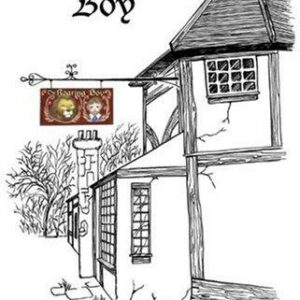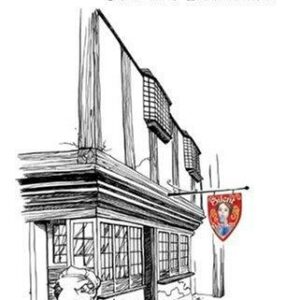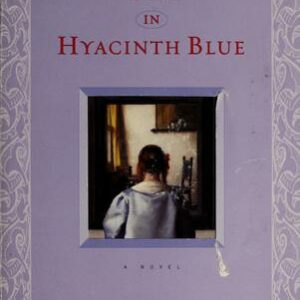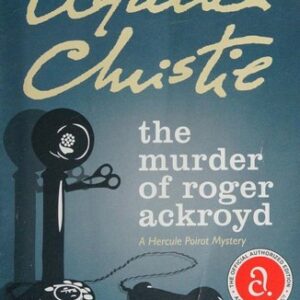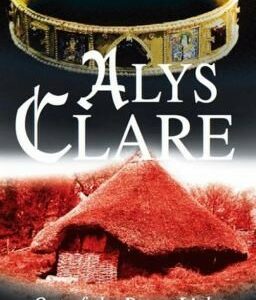Death at the Crystal Palace
$17.00
| Title | Range | Discount |
|---|---|---|
| Trade Discount | 5 + | 25% |
- Description
- Additional information
Description
Intrepid cook Kat Holloway puts aside her apron to delve into Victorian London’s high society and catch a killer in this thrilling new mystery from the New York Times bestselling author of Murder in the East End.
While attending an exhibition at the Crystal Palace, young cook Kat Holloway is approached by a woman in distress. Lady Covington is a wealthy widow convinced that her entire family is trying to kill her. Kat feels compelled to help. So, she escorts the lady home to discover whether she is delusional or in true danger.
When it quickly becomes apparent that the threat is all too real, Kat promises aid. Her charming confidant Daniel McAdam is busy infiltrating a plot against the Crown, and she worries he will not have time to lend his sleuthing expertise. This might be for the best, as Kat fears her growing emotional entanglement with Daniel can only lead to disaster. But soon, Kat faces a more serious threat when her involvement in both investigations plunges her into peril.“Well-drawn supporting characters and logistical details of running a prosperous household complement the intricate plot. Downton Abbey fans will be delighted.”
—Publishers Weekly
“Jennifer Ashley’s ability to bring the food, events, and attitudes of the Victorian era to a compelling mystery will leave you spellbound and literally hungry for more.”
—Historical Novel Society
“Fans will enjoy the continuing exploits of the clever cook, who gets to solve two complex mysteries.”
—Kirkus
“The Kat Holloway Mysteries are extraordinarily well-written and enjoyable visits to Victorian England, full of detail of lives both “Upstairs” and “Down.” The characters are vivid with all the virtues and defects of human beings in any age. I highly recommend the series and am looking forward to the next one.”
—Mystery & Suspense Magazine
“[A]s always, Jennifer Ashley writes a well-written and page-turning novel.”
—Fresh Fiction, on Murder in the East End
“The style is pitch-perfect, with varying and authentically voiced dialog combined with well-balanced description and consistent perspective. Ashley’s fans will be pleased, but it’s also highly recommended to new readers fond of Victorian settings and multilayered mystery.”
—Historical Novel Review, on Murder in the East End
“Jennifer Ashley definitely has a fan in me and I can’t wait to read more in this series.”
—Robin Loves Reading, on Murder in the East End
“This was an exciting, unputdownable read and I hope you enjoy it as much as I did. You certainly cannot go wrong when you have such engaging characters solving such intriguing mysteries.”
—Flippin’ Pages, on Murder in the East End
“Murder in the East End is another winning entrée in an enthralling historical mystery series.”
—Criminal Element
“This series remains excellent: emotional and nuanced, with layers upon layers of resonance in how the characters care for one another.”
—Smart Bitches Trashy Books, on Murder in the East End
“[F]ull of endearing characters and wonderful atmospheric Victorian England setting.”
—Open Book Society, on Murder in the East End
“Murder in the East End has a beautiful mix of suspense and romance that leaves a mark long after the story ends.”
—Feathered Quill Book Review
“This is one of my favorite new series. Ashley writes exquisite historical romance and equally marvelous mysteries.”
—The Washington Post
“A top-notch new series that deftly demonstrates Ashley’s mastery of historical mysteries by delivering an impeccably researched setting, a fascinating protagonist with an intriguing past, and lively writing seasoned with just the right measure of dry wit.”
—Booklist
“An exceptional series launch…Readers will look forward to this fascinating lead’s future endeavors.”
—Publishers Weekly (starred review), on Death Below Stairs
“A smart and suspenseful read, Death Below Stairs is a fun series launch that will leave you wanting more.”
—BustleJennifer Ashley is the New York Times and USA Today bestselling author of the Shifters Unbound series and the Mackenzies series. A winner of a Romance Writers of America RITA Award, she also writes as national bestselling and award-winning author Allyson James.
Chapter One
May 1882
“Please, help me.”
The shaky words came to me from behind a column copied from those at Karnak in Egypt, lit by a chance beam of sunshine through the glass roof high above.
I’d met the woman who spoke them, Lady Covington, only an hour ago, introduced by my friend Mr. Elgin Thanos as the sister of his benefactor. She had paid little attention to me, as I was a domestic accompanying her betters in a treat outing to the Crystal Palace at Sydenham.
Lady Covington had greeted Lady Cynthia Shires, Mr. Thanos, and their friend Miss Townsend with interest, barely registering me and my eleven-year-old daughter standing slightly behind them.
After the visit, Lady Covington and her family had moved off, and Mr. Thanos had escorted the two ladies up to the galleries to take in the view. They had extended the invitation to me, but Grace wanted to see the Egyptian court, so she and I had wandered toward that exhibit, agreeing to meet up for tea later.
Now Lady Covington came to me furtively around the wide column painted with hieroglyphs. Her family—two grown daughters, two grown sons, and her brother—was nowhere in sight.
“Your ladyship?” I made a deferential curtsy, as did Grace. One always curtsies to aristocrats, even when they are begging for help, in case they take offense if you do not. “Are you unwell?”
“Quite unwell.” Another swift glance behind her, then Lady Covington leaned closer to me. “My dear, I have been poisoned.”
I felt Grace’s hand tighten on mine, and my alarm rose. I offered Lady Covington my arm, leaving it up to her whether she took it or not. “You ought to sit down, your ladyship. Why do you think you have taken poison? Are you ill?”
She looked well enough, if flushed, but it was warm this May day under the glass, with tropical plants and indoor ponds trapping the sun’s heat.
Lady Covington’s grip was strong when she laid her hand on my arm, but her gloved fingers shook. Grace said not a word, her eyes full of concern as I steered Lady Covington to the nearest bench. It was of stone, made to look as though it had been lifted from Egypt and transported to England, but I knew full well that all the things in the exhibit had been manufactured specially for the Crystal Palace, based on the real items in the British Museum or private collections.
We sank to the bench together, as Lady Covington did not loosen her grasp. Grace seated herself on the other side of me. Her shoes rested firmly on the floor, which made me realize how long her legs had grown. Soon she would be as tall as I was.
“Would you like a drink of water, your ladyship?” I asked. “Or a cup of tea? I can fetch it while you rest quietly.”
“No.” Her fingers dug into my arm. “No, please do not leave me. I need nothing.”
“If you believe you have taken poison, you must see a doctor. I can call your son, Lord Covington . . .”
“No!” The word was sharper still. “No, I can trust no one. I will be all right, if you sit with me.”
My alarm changed to puzzlement. Was the woman fancying things? Or truly in danger? And what had become of her family?
Lady Covington had a sharp face I imagined had once been pretty, though years, loss, and disappointment were etched into her skin. She was not an old woman, perhaps in her late forties at most, and she was slender, her posture upright. Her eyes were light blue and her hair was a rich, chocolate brown, bearing only a few threads of gray and pulled into a simple style under her high-crowned, mannish hat.
I knew she was quite wealthy, the widow of a railroad magnate who had also been a baron, the title going back generations. Her brother, Sir Arthur Maddox, had recently helped open the Polytechnic in London, a school devoted to educating young men in the sciences. Mr. Thanos, my friend and a brilliant mathematician, had been given a post there. Mr. Thanos had told me, in confidence, that Lady Covington was a generous benefactor to the new school. Sir Arthur could never have been involved without her help.
Lady Covington’s gown was obviously costly, but understated—a brown-and-cream-striped walking dress of light material that draped over her legs and gathered over a bustle in the back. The gown bore few frills, but its cut revealed its expense. A fold of fabric touched my brown woolen frock, which though neat and mended was years out of fashion. The contrast between the two of us could not have been more marked.
“Your ladyship, if you are unwell, I must strongly advise you seek a doctor. He can give you a draught to purge you at the very least.”
Lady Covington shook her head. “You must think me quite mad, Mrs. . . .” She groped for my name.
“Holloway. I am Lady Cynthia’s cook.”
“Yes, that is why I sought you out.” She regarded me with confidence that I would see the obvious connection.
“Are you worried about something you ate?” I ventured.
“Perhaps. I assure you I am not mad, though I understand why you would believe so. They would like to see me dead, Mrs. Holloway.”
“Who would?” I asked in bewilderment.
“All of them. Except dear Jonathan, of course. He has been nothing but a help and guide to me.”
I remembered the flurry of names that flew by as Sir Arthur introduced his family. Jonathan was the younger of Lady Covington’s sons. The older was the current Lord Covington.
“Perhaps I could send for him.”
“Not yet.” Lady Covington craned to see beyond the crowd clustered about the popular Egyptian court.
We sat facing the hall of columns, which were reproductions of those at Karnak, though in a smaller size. Behind us was a replica of the temple at Abu Simbel in Nubia, and to our right was a tomb from another time in Egyptian history, filled with colorful paintings I’d found quite fascinating.
Lady Covington turned back to me. “I am not mad, and I know have been given poison. Not much, which is why I am able to speak to you and do not appear to be ill. Slow poison is wicked, and I am surrounded by wicked people.”
I could hardly argue with her, but I did not understand what she expected me to do. “Why tell me, your ladyship? Your brother could help you—”
“Not Arthur.” Her voice changed to steel. “He would never believe me.”
“Miss Townsend or Lady Cynthia, then. Both are very capable young ladies.”
“I wanted you.” Lady Covington’s anxiousness had receded a bit, and she once more became the widow of an aristocrat, certain of her place. “I have heard of the goings-on in Lord Rankin’s household, and how you made certain the police arrested the correct criminals for heinous things. I want you to call on me. My home is in Park Lane, not far from where you are employed.”
Park Lane contained the mansions of some of the wealthiest families in Britain. I worked in a house in Mount Street, around the corner and a short block away.
A cook did not call upon a rich baron’s widow to sip tea in her parlor, but I could see that Lady Covington was in some distress. She might be imagining things, in spite of her protests, but then again, she might not. I had observed men and women of all walks of life cruel enough to kill another for even trivial reasons.
“I could pay a visit to your cook, if you like,” I suggested. “Or your gardener-do you grow many vegetables or herbs?”
She blinked her pale eyes. “Yes, an excellent excuse. Do come to the garden, tomorrow morning. Ten o’clock. I will speak to you then. But I must—”
“Your ladyship.” A stern female voice cut through Lady Covington’s breathless words. A rather stout woman wound her way around the columns and sightseers to the bench. She had a severe face and hard brown eyes, her gray hair pinned into a tightly twisted bun. “I have been searching everywhere for you.”
The newcomer pinned me with a glare, as though certain I’d waylaid Lady Covington for nefarious purposes.
“Never mind, Jepson.” Lady Covington rose, tone brisk, and I and Grace hopped up beside her. “I was asking Mrs. Holloway about one of her recipes. I’ve told her to bring it to Cook tomorrow.”
A plausible reason for me to enter the house. Apparently, she’d dispensed with my idea of approaching the gardener.
Jepson folded her arms in a fair imitation of one of the Egyptian statues behind her. “They are waiting for you, your ladyship.”
Jepson was a lady’s maid, I surmised. They were usually called by their surnames only, and a lady’s maid was the one servant of the household likely to accompany its mistress on an outing. She would look after Lady Covington’s things and make certain her ladyship was where she needed to be.
“Let them wait,” Lady Covington snapped. “I’ll not come to heel for that pack of hounds. They depend on me, not the other way about.”
“Yes, your ladyship.” Jepson’s pursed mouth told me she’d heard this rant from her mistress many a time.
Lady Covington gave me a stiff nod. “Thank you for speaking with me, Mrs. Holloway. Please greet Mrs. Bywater for me. I am looking forward to your recipe.”
Jepson’s eyes narrowed, and she switched her gaze to me. “Recipe for what?”
Lady’s maids could be less censured for impertinence than other servants, if they had an understanding with their mistress, but this was rude even so. Lady Covington flushed.
“Lemon cake,” she said quickly. “I fancied some. Come along, Jepson. As you say, I should not keep my stepson waiting. George is foul when he’s cross.”
Without further farewell to me, Lady Covington stepped past Jepson and headed from the exhibit toward the nave. Sunlight through the glass above us caught on the brown satin ribbon around her hat. Jepson, with another suspicious glare at me, followed her mistress.
“Poor lady,” Grace said, watching the pair go with sympathy. “She is very frightened.”
“Yes, I believe she is.” I took my daughter’s hand. “You were very good to say nothing. You are a well-behaved young lady.”
Grace didn’t smile or preen—she regarded me solemnly. “Mrs. Millburn says it’s ridiculous to believe that children should be seen and not heard. But even so, she says it’s polite to remain quiet when meeting ladies and gentlemen until they speak to me first.”
“Mrs. Millburn is quite right.” Joanna Millburn, my greatest friend, had kindly taken in Grace and looked after her so I could earn my living. “You are a credit to her.”
Grace blushed but accepted the praise with modesty. “Will you help Lady Covington?”
She stated the words without pleading, but I could see that Grace was worried for the woman. As was I.
“Of course I will,” I said. “I will visit her tomorrow, as she requests. But first, I must invent a recipe for lemon cake to take to her.”
US
Additional information
| Dimensions | 0.9000 × 5.0000 × 8.0000 in |
|---|---|
| Series | |
| Imprint | |
| ISBN-13 | |
| ISBN-10 | |
| Author | |
| Audience | |
| BISAC | |
| Subjects | crystal books, murder mystery books, women sleuths, women sleuths mysteries, crime thriller books, murder books, mystery book, victorian mysteries, crystal book, historical mystery novels, jennifer ashley, paperback mystery, british mystery books, murder book, jennifer ashley books, kat holloway, crystals book, romance, FIC027170, crime books, historical mystery, suspense books, thriller books, historical romance, mystery books, victorian, FIC022060, historical fiction, mysteries, murder mysteries, romance books, mystery, detective |


